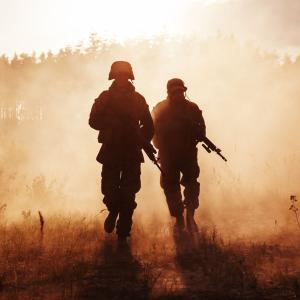In his brutally honest treatment of men in war, philosopher and soldier J. Glenn Gray reflects on man’s strange relationship with combat:
Beyond doubt there are many who simply endure war, hating every moment. Though they may enjoy garrison life or military maneuvers, they experience nothing but distaste and horror for combat itself. Still, those who complain the most may not be immune from war’s appeals. Soldiers complain as an inherited right and traditional duty, and few wish to admit to a taste for war. Yet many men both hate and love combat. They know why they hate it; it is harder to know and to be articulate about why they love it. The novice may be eager at times to describe his emotions in combat, but it is the battle-hardened veterans to whom battle has offered the deeper appeals. For some of them the war years are what Dixon Wecter has well called “the one great lyric passage in their lives.”
J Glenn Gray, The Warriors, Apple Books.
In the previous post in this series, I spoke of human beings as both homo religiosus and homo faber–man as a religious creature and man as a maker of things–respectively. I argued that man as a religious creature was more fundamental than man as a maker of things, although historically the latter may have preceded the former. However, there is another way to think of those creatures that fall into the biological category, homo sapien. This is man as homo furens, or as fighting man. In this final essay I will try to tackle the hardest question of the three questions I posed at the outset: “Was Afghanistan worth it for the soldiers who fought the war?”
Just and Unjust War and The Soldier’s Experience
There is no objective answer to the question just posed. Each soldier, and his or her family, will have a subjective response to the question, “Was it worth it for you?” to fight in Afghanistan. While there may be a question about the value of a given conflict that might have an objective answer to it, one that accounts for the just nature of that conflict, how each individual soldier experiences that conflict, just or unjust, is not that kind of question. Soldiers who might have fought in what many consider to be a just war, like World War II, nevertheless may not have experienced it as worthwhile. The sheer horror of the experience of war can often overwhelm even the most unjust conditions and righteous motivations that necessitated it.
At most we could hope that if there are just wars, like World War II, we happen to find ourselves in them and not in other wars that are unjust, perhaps Vietnam or Iraq. Of course, the fact is we often do not know with certitude, either through ignorance or through the moral complexity of large-scale human interaction, the answer to the question of whether the conflict we fought in was just or not. However, I do believe it would be good, and perhaps even therapeutic, for soldiers to consider this question of just war. Hopefully, before they ever put on a uniform.
I do recall hearing one fellow Christian soldier upon our arrival in Afghanistan say to our chaplain, “I am not sure we should be here. After all, I am a Christian. Maybe this war is wrong.” As genuine and as important as that soldier’s questions were, it seemed to me at the time it was a bit late to just now start thinking about them. Of course, it was probably better to consider them even at that late date than never to consider them at all.
Alternatively, it could be that a soldier has an experience of war as “worth it” regardless of how one judges the moral nature of that war. Soldiers can experience war as worth it in a few ways. First, they can, as Gray points out with incredible sensitivity, come to know their time in war as the most profound time of their human existence. This is something that has been written about over and over again, for centuries. That war can be understood as “the father of us all” (Heraclitus) speaks to something in our human nature that is both grotesque and fascinating at the same time. This dynamic can be, as Gray points out, aesthetic in nature:
Yes, the chief aesthetic appeal of war surely lies in this feeling of the sublime, to which we, children of nature, are directed whether we desire it or not. Astonishment and wonder and awe appear to be part of our deepest being, and war offers them an exercise field par excellence.
Excerpt From: J Glenn Gray, The Warriors. Apple Books.
Those who have experienced war, especially heavy combat, know the sheer grandeur of its spectacle. One stands in awe before the power, the complexity, the strangeness of war. For myself, although my experience in combat was limited, I would make the experience of war only second to a religious experience of God when it comes to the pure stimulation of the totality of the human person. Soldiers speak of getting tunnel vision in combat as all other features of reality are stripped away and body and soul are unified and focused in a way that is unlike any other. Sexual experience, perhaps the third most powerful kind of experience, pales in comparison to war. It is the kind of experience that made Robert E. Lee famously say “It is well that war is so terrible–we would grow too fond of it.”
Of course, there are many moral and spiritual problems with seeing war as worthwhile in this way. Especially for Christians, called to the law of love, how could we dare to relish in this aspect of human nature, one clearly contingent upon, and a direct product of, the reality of sin. That war is magnificent in this sense, that it may attract us, makes us very uneasy as soldiers of Christ who strive for peace and long for shalom among men.
Virtue, Camaraderie and Love in War
There are other things about war that could make it, again regardless of its objective status as just or unjust, worthwhile to the individual soldier. War, unlike any other human endeavor, can spawn incredible acts of virtue and create bonds of friendship and camaraderie which are rarely found outside of it. With regard to genuine camaraderie among soldiers, i.e., the bands that hold brothers in arms together, Gray points out the unlikelihood of such friendships. These friendships are forged in the flames of conflict, and only there:
Near the front it was impossible to ignore, consciously or unconsciously, the stark fact that out there were men who would gladly kill you, if and when they got the chance. As a consequence, an individual was dependent on others, on people who could not formerly have entered the periphery of his consciousness. For them in turn, he was of interest only as a center of force, a wielder of weapons, a means of security and survival. This confraternity of danger and exposure is unequaled in forging links among people of unlike desire and temperament, links that are utilitarian and narrow but no less passionate because of their accidental and general character.
J Glenn Gray, The Warriors. Apple Books.
The bonds between soldiers may well be pragmatic, at least at the beginning, but that does not make them any less passionate or real. The “social capital” among soldiers is well known, and while it may be a sad commentary on human nature that it takes something like war to bring people together who otherwise would not “enter into the periphery of each other’s consciousnesses,” that it happens is a genuine fact. One WWII infantry correspondent put it simply:
The ties that grow between men who live savagely and die relentlessly are ties of great strength. There is a sense of fidelity to each other who have endured so long and whose hope in the end can be so small.
Ernie Pyle
As Sebastian Jünger has pointed out, even left-wingers (like himself) go to see war movies like Saving Private Ryan. It is to witness the noble virtue and the love that seems to only emerge in the middle of man’s worst nightmares that such theatricals are made and enjoyed. We all gravitate to the spectacle of war, even if only on the silver screen, because it is in war we find a wellspring of meaning through the sacrificial love we all long for, yet cannot find in our otherwise decadent and self-centered existence. In short, one dare not discount that these realities of war also play a part in making one’s service in Afghanistan worth it to the average soldier. They most certainly do.

And Then There is Evil
Finally, and from a theological perspective, one must take into consideration the nature of evil. Fighting against, deterring and preventing evil has always been the single most definitive criteria of any Christian Just War Theory. Self-defense, so exalted in some contemporary political circles, was never a part of the Augustinian just war tradition. However, protecting the innocent from barbarity was central from the very beginning of the Church’s reflections on the just application of violence.
Therefore, for any soldier, but especially any Christian soldier, there is a question to ask oneself, “did I fight against evil, and did I do it in the right way?” This is a question that is beyond my ken to answer here, but it is important to know that it has been asked by many throughout the centuries and throughout the church’s history. Nigel Biggar, referring to Augustine’s thoughts on just violence, summarizes the Bishop of Hippo on combating evil:
Since the norm of love for the neighbour is central to the moral teaching of Jesus–and, indeed, to that of St Paul–any theory of just war that wishes to call itself ‘Christian’ will have to follow Augustine in arguing that the use of violent force can be a form of ‘kind harshness’. That it can be kind is straightforwardly plausible with regard to the neighbour who is the innocent victim of attack; but its plausibility is not so obvious with regard to the neighbour who is himself the unjust aggressor.
Nigel Biggar, In Defence of War, 13.
Whether or not it was right or just to kill Taliban is a question any Christian soldier who fought in Afghanistan must ask themselves. Foremost those who were directly involved in combat and then those who supported such operations. But that that same killing was an act of kindness toward the innocent victims of Taliban oppression is something every soldier should be aware of, even if they have never heard of the law of double effect.
In my own experience, while having an early mid-life crisis at the age of 32, I found myself motivated to do something beyond what my current lifestyle was demanding. Although I was theologically confused at the time, I knew one thing with relative clarity. I knew that if I was going to dramatically alter my life, I had to choose to do something that would put me in a direct fight against evil. For one thing I did know, in spite of the lack of Christ in my life, was that evil existed in the world. Thus, before I enlisted in the Army I considered what were the most concrete manifestations of human wickedness I could think of. The first was child sex trafficking. The second was the Taliban. Only later did I find out that the Taliban was as much into the first as they were into supporting global terrorism.
In my experience, if there ever was an enemy that warranted physical elimination, it is the Taliban. I think many fellow soldiers will agree with me on this point.
Was Afghanistan Worth it For American Soldiers?
It is a question I ultimately cannot answer for anyone but myself. That said, I find that Afghanistan was worth it for me, even though my experience was quite limited (which is certainly a factor to consider in my evaluation). I think Afghanistan could have been worth it for other soldiers as well, and that regardless of the just or unjust nature of the conflict or even of any long term political or military success (of which there seems to be none in view). Why could Afghanistan be worth it for individual soldiers (be they still with us today or not)?
To conclude, Afghanistan might be worth it if soldiers know, or at least strongly suspect, that they acted virtuously during their time in service. It was worth it if they know, or at least strongly suspect, that they built bonds of friendship and camaraderie they otherwise never would have had. And finally, it was worth it if they know, or at least strongly suspect, that they were integral in fighting against a truly evil and cruel enemy and, in doing so, were part of protecting the innocent from harm.
If these things are known by any soldier, then I think that soldier can know that their time in Afghanistan was worthwhile and that their service was valuable in ways that many civilians simply cannot understand. The preservation of goodness, freedom and beauty in this world infested with sin, sometimes takes the form of physical battle, of “kind harshness.” Finally, we should remember that there is a hope for a justice that is not the work of human hands, a justice that will harmonize all things together and makes sense of the senseless. Nigel Biggar reminds of us of this Divine hope:
This is the hope that the justice that we humans cannot do here and now–the raising from the dead of innocent victims, the meting out of retribution upon those perpetrators who have escaped earthly punishment, the maturing of penitence and reconciliation that history has cut short–will yet be done by God at the end of history.
Biggar, 77














